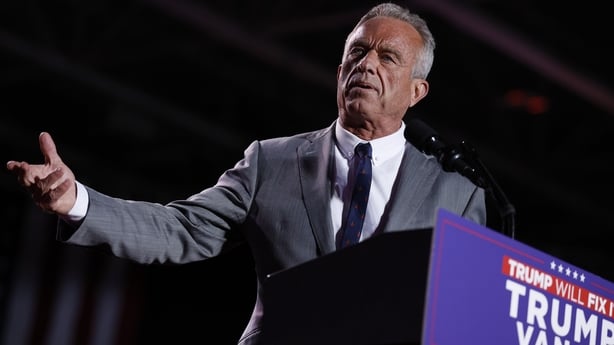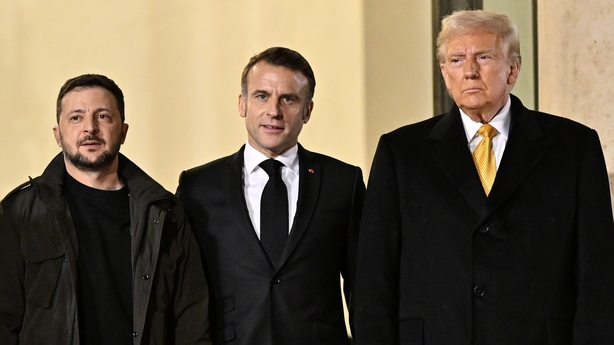Time Magazine has named US president-elect Donald Trump its "Person of the Year" for the second time.
Mr Trump was also named Time's Person Of The Year in 2016 when he first won the US Presidential election.
US Vice President Kamala Harris, Tesla CEO Elon Musk and Israeli Prime Minister Benjamin Netanyahu were among the well-known names on the magazine's shortlist this year.
Mr Trump rang the opening bell at the New York Stock Exchange at 9.30am, a first for him and called the title "a tremendous honour".
"Time Magazine, getting this honour for the second time, I think I like it better this time actually," he said.
The Time magazine cover featuring him was projected onto a wall at the stock exchange, flanked by American flags.
Mr Trump, accompanied by his wife, Melania Trump, daughters Ivanka and Tiffany and vice president-elect JD Vance, grinned as people chanted "USA" before he rang the bell.
He then raised his fist.
Sam Jacobs, Time's editor in chief, announced on NBC’s Today show that Mr Trump was Time’s 2024 Person of the Year.
Mr Jacobs said Mr Trump was someone who "for better or for worse, had the most influence on the news in 2024".
"This is someone who made an historic comeback, who reshaped the American presidency and who’s reordering American politics," Mr Jacobs said.
"It’s hard to argue with the fact that the person who’s moving into the Oval Office is the most influential person in news."
He added that "there’s always a hot debate" at the magazine over the honour, "although I have to admit that this year was an easier decision than years past".
In an interview with Time, Mr Trump said that he will have a "big discussion" about ending childhood vaccination programs with vaccine skeptic Robert F Kennedy Jr, his nominee to run the Department of Health and Human Services, and his new administration could scrap some vaccines.
"We're going to have a big discussion.
"The autism rate is at a level that nobody ever believed possible. If you look at things that are happening, there's something causing it," Mr Trump said.
Asked if his administration could get rid of some vaccines, Mr Trump said: "It could if I think it's dangerous, if I think they are not beneficial, but I don't think it's going to be very controversial in the end."
Asked if he thinks childhood autism is linked to vaccines, Mr Trump said: "No, I'm going to be listening to Bobby," referring to Mr Kennedy.

Mr Trump said he had a lot of respect for Mr Kennedy and his views on vaccinations.
"He does not disagree with vaccinations, all vaccinations. He disagrees probably with some," Mr Trump said.
Mr Kennedy has been criticised for making false medical claims, including that vaccines are linked to autism.
He opposed state and federal Covid-19 restrictions and was accused of spreading misinformation about the virus.
He disputes the anti-vaccine tag, but chaired the Children’s Health Defense, a nonprofit organization that focuses on anti-vaccine messaging.
Mr Trump was asked if he agreed with Mr Kennedy on a link between vaccines and autism.
"I want to see the numbers," he said. "At the end of the studies that we're doing, and we're going all out, we're going to know what's good and what's not good."
Trump criticises Ukraine's use of US missiles
Mr Trump also criticised Ukraine's use of US-supplied missiles for attacks deep into Russian territory, comments that suggest he would alter US policy toward Ukraine.
"It's crazy what's taking place. It's crazy. I disagree very vehemently with sending missiles hundreds of miles into Russia.
"Why are we doing that? We're just escalating this war and making it worse.
"That should not have been allowed to be done," he said.
President Joe Biden last month lifted the US ban on Ukraine using US-supplied longer-range missiles for strikes deep inside Russia, his latest attempt to boost Ukraine in its battle to repel a Russian invasion force from his country.

The decision came after pleas from Ukraine President Volodymyr Zelensky.
The White House cited Russia's deployment of 15,000 North Korean troops along the battlefront as the main reason why Mr Biden changed his mind.
Mr Trump has said he would like to bring a quick end to the nearly three-year-old war.
He told Time he had a "very good plan" to help but that if he reveals it now "it becomes almost a worthless plan".
Mr Trump, who takes office on 20 January, met last weekend with Mr Zelensky and French President Emmanuel Macron in Paris.
He told Time that the number of people dying in the conflict is not sustainable.
"I'm talking on both sides. It's really an advantage to both sides to get this thing done," he said.
Additional reporting PA

